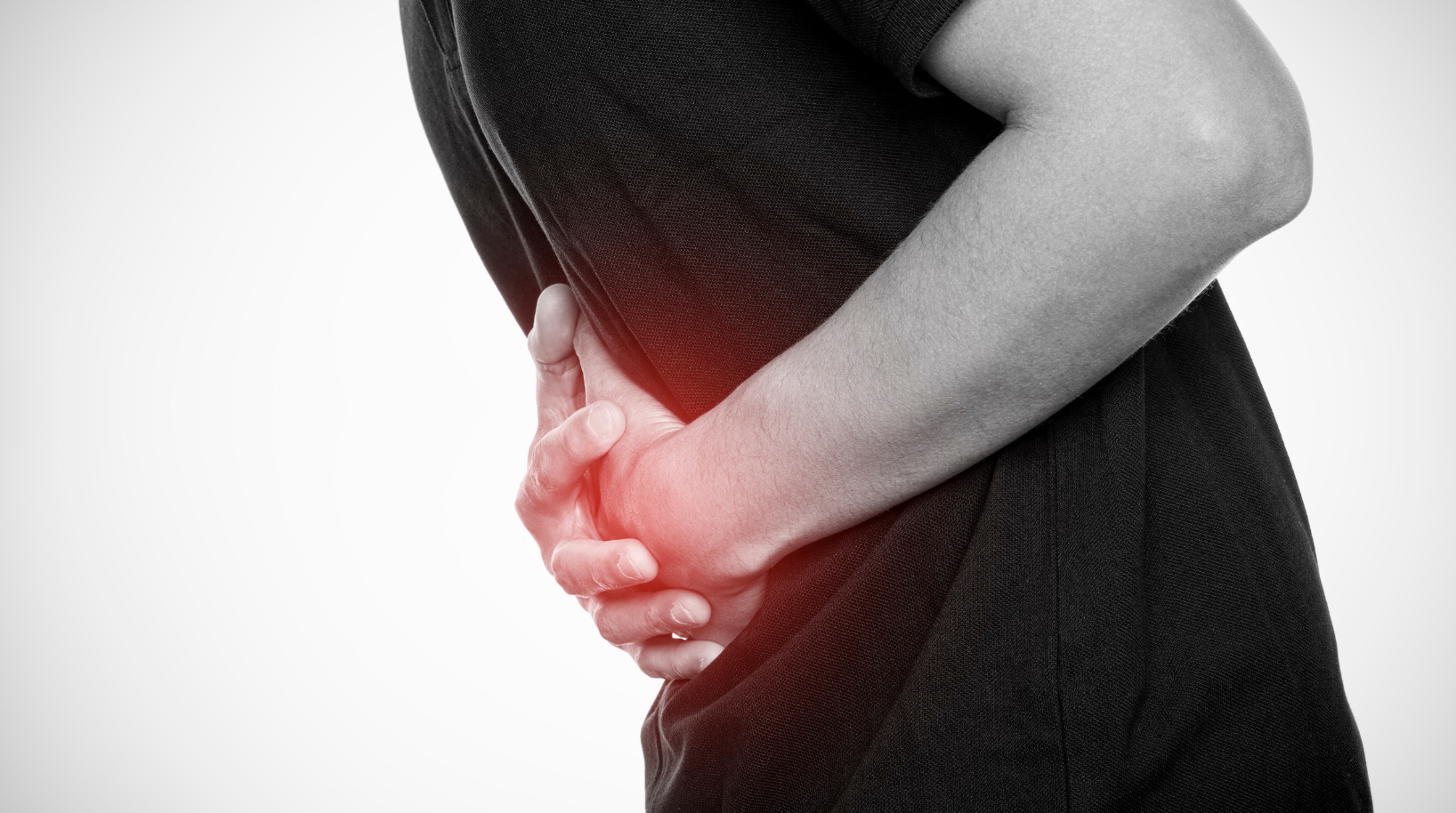Bloating is a joint discomfort many people experience daily. Did you know that simple lifestyle changes can significantly reduce bloating? This article offers practical tips for immediate relief from bloating.
Keep reading to feel better today!
Key Takeaways
- Eating smaller portions and avoiding foods that cause gas, such as beans and onions, can reduce bloating. Adding ginger or peppermint tea to your diet may help.
- Keeping a food diary helps identify food intolerances or triggers for bloating. To manage discomfort, try low-FODMAP, lactose-free, or gluten-free diets.
- Drinking plenty of water daily and minimizing drinks like alcohol help prevent bloating by keeping you hydrated and flushing out excess sodium.
- Regular exercise stimulates the digestive system, helping move food and waste through your gut more efficiently, thus reducing the risk of bloating.
- If changing your diet or using home remedies doesn’t relieve your bloating, it’s important to seek advice from professionals like nutritionists or gastroenterologists.
Understanding Bloating and Its Causes
Understanding Bloating and Its Causes: Diet, digestive disorders, and hormonal influences can all contribute to bloating. Making healthy dietary choices and managing food intolerances are essential for preventing uncomfortable bloating episodes.
Diet
Eating the right foods can significantly influence how your body handles bloating. Some foods are known to cause gas and bloating, like beans, lentils, broccoli, cabbage, onions, and fizzy drinks.
Cutting down on these can offer immediate relief from discomfort. On the other hand, incorporating ginger, bananas, peppermint tea, and yogurt into your meals might help ease digestion and reduce bloated feelings.
Adjusting your diet is a cornerstone in managing bloating effectively.
It’s also crucial to focus on smaller portions during meals to prevent overeating which often leads to feeling uncomfortably full. Chewing food slowly helps too since it reduces air swallowing that contributes to bloating.
As you refine your eating habits for better digestive health remember that hydration plays a pivotal role in flushing out excess sodium that retains water in the body.
Shifting focus towards understanding digestive disorders offers more insight into tackling chronic bloating issues efficiently.
Digestive disorders
Digestive disorders such as irritable bowel syndrome (IBS), celiac disease, and Crohn’s disease often lead to bloating. These conditions disrupt the normal function of the digestive system, causing gas build-up and discomfort.
Proper diagnosis and treatment are crucial for relief. Consulting a gastroenterologist can identify specific triggers and develop a management plan.
Lifestyle changes play a significant role in managing symptoms of digestive disorders. Increasing fiber intake gradually, staying hydrated, and practicing mindful eating can help reduce bloating.
Avoiding foods known to worsen symptoms is also key. For some, gluten or lactose may trigger bloating; identifying and eliminating these from your diet with professional guidance can offer immediate relief.
Hormonal influences
Moving from digestive disorders, it’s crucial to consider how hormones play a significant role in bloating. Hormonal changes can trigger bloating, especially for women during their menstrual cycle.
Estrogen and progesterone levels fluctuate throughout the month, affecting fluid retention and causing the body to bloat.
To manage hormonal-related bloating, tracking your cycle can help identify patterns and predict when bloating might hit. Simple lifestyle adjustments like increasing water intake during specific times of the month or incorporating light exercise can significantly ease discomfort.
Recognizing these patterns allows for more effective interventions to reduce bloating associated with hormonal fluctuations.
Ways to Prevent and Manage Bloating
Prevent and manage bloating effectively by practicing mindful eating, staying hydrated, engaging in regular exercise, managing food intolerances carefully, and following specialized diets such as low-FODMAP or lactose/gluten-free.
Incorporate these strategies into your daily routine for a noticeable reduction in bloating discomfort.
Mindful eating
Mindful eating involves being present and attentive while consuming food. Here are key points to consider:
- Focus on your meal and avoid distractions such as screens.
- Chew slowly and savor the flavors of each bite.
- Pay attention to your body’s hunger and fullness signals.
- Be mindful of portion sizes, and stop eating when you feel satisfied.
- Choose whole, unprocessed foods for nutrient-dense meals.
- Practice gratitude for the food you are consuming.
Hydration
Proper hydration is essential for preventing bloating. Drinking plenty of water helps flush out excess sodium and reduce water retention, alleviating that uncomfortable full feeling.
Aim to drink at least 8-10 glasses of water per day, and consider adding hydrating foods like cucumbers, watermelon, and oranges to your daily diet. Avoid excessive alcohol and sugary drinks, as they can contribute to dehydration and bloating.
Staying well-hydrated not only supports digestion but also promotes overall wellness.
Optimizing hydration levels is crucial in reducing bloating. Consuming an adequate amount of fluids assists in maintaining healthy digestion and diminishing the discomfort caused by excess gas buildup.
Maintaining a regular intake of water throughout the day, along with consuming high-water-content fruits, can help keep you feeling light and comfortable while combating bloating.
Exercise
Regular exercise can help reduce bloating by promoting better digestion and reducing constipation. Physical activity, like brisk walking, cycling, or swimming, helps to stimulate the muscles in your digestive system.
This stimulation aids in moving food and waste more efficiently through your gut. Additionally, regular exercise can help reduce water retention, which may contribute to bloating.
Consistent physical activity supports overall gut health and may lead to reduced symptoms of bloating over time.
Managing food intolerances
Food intolerances can cause discomfort and bloating. Identifying and avoiding trigger foods is essential. Keep a food diary to track symptoms, then eliminate problem-causing items.
Opt for low-FODMAP, lactose-free, or gluten-free alternatives if needed. It’s crucial to read labels meticulously when grocery shopping to avoid potential triggers.
Adopting a mindful approach towards eating may also help manage food intolerances. Take note of how your body reacts after consuming certain foods and make adjustments accordingly.
Special diets (low-FODMAP, lactose/gluten-free)
Special diets like low-FODMAP, lactose/gluten-free can be very effective in managing bloating. These diets aim to reduce or eliminate specific components that may trigger bloating in some individuals. Here are the key elements of these special diets:
- Low-FODMAP Diet: This diet restricts certain types of carbohydrates that are not easily absorbed in the small intestine and can cause digestive issues. Foods to include: gluten-free grains, vegetables (excluding high FODMAP ones), fruits (excluding high FODMAP ones), and certain proteins.
- Lactose-Free Diet: This diet involves avoiding foods that contain lactose, such as milk, cheese, yogurt, and ice cream. It’s essential to opt for lactose-free alternatives.
- Gluten-Free Diet: This diet excludes foods containing gluten, a protein found in wheat, barley, and rye. Opt for gluten-free grains like quinoa and rice along with naturally gluten-free foods.
By adopting these specialized diets as part of your approach to managing bloating, you can work towards reducing discomfort and promoting better digestive health.
Home Remedies for Quick Relief
Ease bloating with simple home remedies. Probiotics and herbal tea can bring quick relief from discomfort.
Probiotics
Probiotics help to restore the balance of good bacteria in your gut, aiding digestion and reducing bloating. Consuming probiotic-rich foods like yogurt, kefir, kimchi, and sauerkraut or taking probiotic supplements can support a healthy gut flora, alleviating bloating symptoms effectively.
These microorganisms work by improving the balance of beneficial bacteria in your digestive system. Introduce probiotics into your diet to alleviate bloating while promoting overall digestive wellness.
Moving on to “Herbal Tea” – let’s explore another home remedy for quick relief from bloat.
Herbal tea
Brew a cup of herbal tea for relief from bloating. Herbal teas like peppermint, ginger, chamomile, and fennel can help soothe an upset stomach and reduce bloating. These teas contain natural properties that aid digestion and ease discomfort associated with bloating.
A warm cup of herbal tea after meals or whenever you feel bloated can provide quick relief without any side effects. Incorporate these soothing brews into your daily routine to combat bloating effectively.
Light exercise is another effective way to alleviate bloating symptoms.
Light exercise
Light exercise, such as a brisk walk or gentle yoga, can help alleviate bloating by stimulating digestion and reducing gas buildup. Physical activity encourages movement in the digestive tract, which aids in relieving discomfort and promoting regular bowel movements.
Additionally, regular light exercise can contribute to improved gut health and may help prevent bloating over time.
Incorporating light exercise into your daily routine helps reduce bloating and promotes overall well-being. Make it a habit to take short walks after meals or integrate simple stretching exercises into your day for long-term relief from bloating.
Avoiding certain foods/beverages
Avoid foods and drinks known to cause bloating, such as carbonated beverages, high-sodium processed foods, cruciferous vegetables like broccoli and cabbage, beans, and dairy products if lactose intolerant.
Read nutrition labels for hidden sources of sugar alcohols or fructose, common bloating culprits. Minimize consumption of greasy or fried foods, which can slow digestion and lead to discomfort.
To reduce the risk of bloating, opt for water instead of sugary sodas. When possible, swap out high-fat dairy milk with almond or lactose-free alternatives. Limit your intake of artificial sweeteners found in diet products, as they can disrupt digestion and contribute to bloating.
Seeking Professional Help
Consult a nutritionist or dietitian for personalized advice on managing bloating. Explore over-the-counter options and consider possible medication interactions, or see a gastroenterologist for specialized guidance.
Consulting a nutritionist or dietitian
Nutritionists or dietitians provide personalized guidance to address bloating concerns. They develop tailored meal plans, incorporating low-FODMAP or dairy/gluten-free diets as needed.
A nutritionist can also identify trigger foods and recommend suitable alternatives supported by relevant dietary adjustments for long-term relief.
Seeking professional help is crucial in addressing bloating issues that persist despite home remedies. Nutritionists offer expertise in crafting specific dietary strategies to alleviate discomfort and promote digestive wellness.
Over-the-counter options
If you find yourself in need of quick relief from bloating, over-the-counter options can provide some assistance. Digestive enzymes can aid in breaking down hard-to-digest foods, while activated charcoal supplements may help absorb excess gas and reduce discomfort.
Additionally, over-the-counter antacids containing simethicone can help break up gas bubbles and ease bloating. Always consult a healthcare professional before starting any new over-the-counter treatments to ensure they are suitable for your specific needs.
Seeking Professional Help – Consulting a nutritionist or dietitian
Medication interactions
When considering how to manage bloating, it’s important to be cautious of potential interactions between medications and their effects on the digestive system. Some over-the-counter remedies and prescription medications can impact digestion and contribute to bloating or discomfort in some individuals.
Always consult with a healthcare professional before starting any new medication or supplement, especially if you are already taking other medications for existing health conditions.
It’s essential to communicate openly with your doctor or pharmacist about all the medications you are currently taking to avoid any potential adverse reactions that could worsen bloating symptoms.
Seeing a gastroenterologist
If you experience persistent bloating that doesn’t improve with dietary changes or over-the-counter remedies, it may be time to see a gastroenterologist. A gastroenterologist can help diagnose underlying digestive issues such as irritable bowel syndrome (IBS), inflammatory bowel disease (IBD), celiac disease, or other gastrointestinal disorders that might be causing your bloating.
They have the expertise and tools to conduct thorough evaluations and diagnostic tests tailored towards identifying the root cause of your symptoms.
Consulting a gastroenterologist is crucial for pinpointing the exact triggers of your bloating and establishing a personalized treatment plan to address your specific needs. By seeking professional help from a specialist, you can unlock the secrets behind your digestive health to achieve relief from chronic bloating.
Conclusion
Say goodbye to bloating with these quick and effective tips for immediate relief. Implement mindful eating, stay hydrated, and incorporate regular exercise into your routine to prevent and manage bloating effectively.
Consider home remedies such as probiotics and herbal tea for quick relief. Seeking professional help from a nutritionist or gastroenterologist can provide personalized guidance in managing bloating issues.

